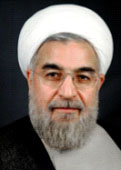DUBAI, (Reuters) – Gains by reformist candidates in Iranian elections open the way for changes to economic policy that will boost foreign investment and trade with the West, businessmen and analysts said yesterday.
Friday’s vote ended more than a decade of conservative domination of the legislature and the Assembly of Experts, a body that oversees the Islamic republic’s supreme leader.

The outgoing parliament, filled with hardliners suspicious of detente with the West, had acted as a brake on President Hassan Rouhani’s plans to strengthen the private sector, tackle corruption and welcome foreign investors.
Rouhani, the architect of last year’s nuclear deal with world powers, is now expected to find it easier to push legislative reforms making the economy more attractive to foreign firms.
“In economic affairs the next parliament will be much better than the current parliament,” said Saeed Leylaz, an economist who served as advisor to reformist former president Mohammad Khatami.
Iran faces deep problems including corruption, a shortage of investment and a lack of productivity, but “all these problems can be solved through liberalising the economy,” he said.
Iranian investment banker Ramin Rabii said he expected the new parliament to address issues crucial to the business sector such as updating the country’s commercial code, modernising labour laws and improving stock market regulation.
“If you have a parliament that is friendlier to the executive branch, things tend to move forward more easily,” said Rabii, chief executive of investment group Turquoise Partners.
“When business-related regulations need to be passed, or joint venture agreements are signed with foreign partners and are scrutinised by parliament – it all goes more smoothly.”
One early result of the elections could be to allow the government to offer new oil and gas contracts to foreign firms, a cornerstone of its plans to raise energy production after international sanctions on Tehran were lifted last month.
Iran had been scheduled to unveil the new contracts to international oil firms at a conference in London on Feb. 22-24. The conference was cancelled earlier this month; oil executives blamed political feuding before the elections.
It is not clear if the election result could affect Iran’s willingness to agree in talks with OPEC and non-OPEC oil producers on a proposed output freeze to prop up crude prices. But by giving the Rouhani administration a popular endorsement, the result appears likely to leave the administration with more domestic political freedom to sign a deal if it chooses.
Early election results yesterday showed moderates and reformists dominating both elections in Tehran, and making significant gains elsewhere in the country. Full results are expected to be released in coming days.
The elections do not leave the Rouhani administration with a completely free hand on economic policy. Many powers will remain in the hands of conservatives; the Guardian Council, an unelected clerical body, has the power to vet all laws, and Supreme Leader Ayatollah Ali Khamenei has the last word on all important matters of state.
